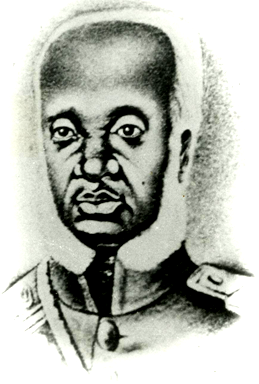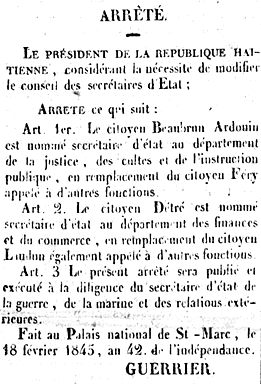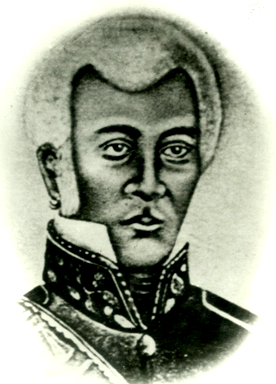"The Politique de Doublure" by the Island Luminous Editorial Board
Although the Hérards did not implement the most-liberal provisions of the Constitution of 1843, the mere proposal of such reforms alienated the old elite who had supported Boyer. Led by Beaubrun Ardouin, the Boyerists cornered the Hérards and forced them into exile.
However, Rivière-Hérard’s old supporters in the south, "the Praslinites," had already stirred populist and democratic sentiments that prevented Ardouin or another mulatto of the elite from seizing power like Boyer before them. Instead, Ardouin selected Philippe Guerrier, a noir and popular war hero from the Battle of Vertières, to rule on their behalf.
The elites’ rule by proxy became known as polique de doublure. Although Guerrier was president, the Boyerists gave the orders. Not long into his presidency, the kingmakers began to fill the highest offices. Guerrier made Ardouin Minister of Justice.
At almost ninety years of age, President Guerrier passed away less than a year into his presidency. The men who had elevated him to power organized a council and chose a successor, Jean-Louis Pierrot. As Henri Christophe’s brother-in-law, Pierrot was popular in the north, but not in the south. The council resumed the politique de doublure and kept a close eye on the Praslinites, who eventually rebelled, but were suppressed.
When his opponents at home were put down, Pierrot turned his attention to the Dominican Republic. He believed that Dominican independence would invite European imperialism to Hispaniola. The Dominicans, however, were determined to thwart yet another Haitian invasion. They took to arms and met the Haitian invaders in small battles on the frontier.
By 1846, soldiers in the Haitian army were discontent. They rejected new orders to continue the attack. Instead they supported General Jean-Baptiste Riché, who marched to Port-au-Prince and deposed Pierrot. Riché, however, would not dissolve the council. Rather than make enemies with the men who empowered his predecessors, he renamed the council the senate and assumed the presidency with its support.


